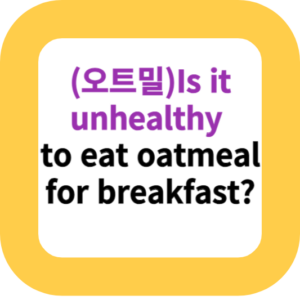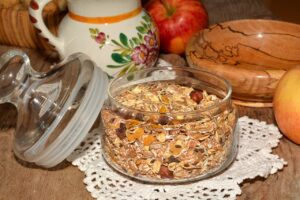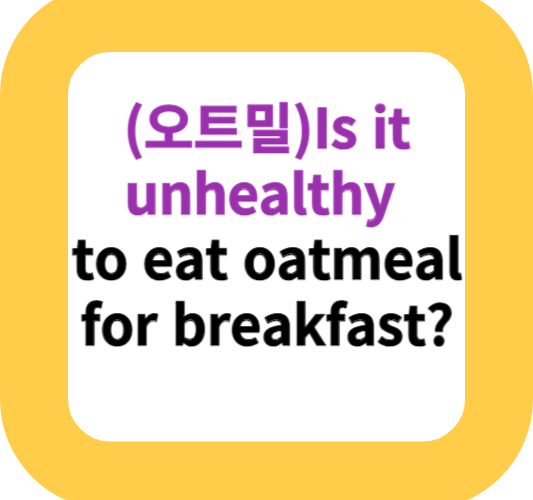(오트밀)Is it unhealthy to eat oatmeal for breakfast?
Welcome to our latest blog post where we delve into the often-debated topic of oatmeal as a breakfast choice. Widely celebrated for its whole-grain goodness and array of health benefits, oatmeal is a staple in many diets. Yet, is it always the healthiest option?
This comprehensive article unpacks the complexities surrounding oatmeal, exploring how factors like added sugars, portion sizes, toppings, and individual dietary needs can impact its nutritional value.
From discussing how certain preparations can transform this humble grain into a less desirable option, to offering insights on making oatmeal a nutritious and satisfying part of your morning routine, we provide a balanced perspective.
Whether you’re an oatmeal enthusiast or skeptic, this post will equip you with the knowledge to make informed choices about incorporating oatmeal into your diet, tailored to your unique health goals and preferences. Join us as we explore the nuanced world of oatmeal, where health and taste converge.
Is it unhealthy to eat oatmeal for breakfast?

Introduction: The Nuanced Health Profile of Oatmeal
Oatmeal, a staple in many breakfast menus, is renowned for its health benefits, primarily due to its whole-grain composition. However, the perception of oatmeal as a universally healthy choice is more complex and varies based on its preparation, type, and individual dietary preferences and needs.
This expanded article delves into the various aspects that sometimes place oatmeal in a less favorable light, while also highlighting how it can be part of a nutritious diet.
Added Sugars: A Hidden Health Trap
A key issue with some types of oatmeal, particularly the flavored instant varieties, is the high level of added sugars. These sugars not only increase the calorie content but are also linked to a range of health problems, including obesity, type 2 diabetes, and heart disease.
The consumption of added sugars in a supposedly healthy breakfast option can thus negate many of the benefits that oatmeal naturally offers.

Portion Size: A Question of Quantity
While oatmeal itself is a nutritious whole grain, consuming it in large quantities, especially when combined with high-calorie toppings like nuts, honey, or fruit, can lead to overeating. Large portions can significantly increase the calorie intake, contradicting the goal of a health-conscious diet.
Toppings and Mix-Ins: Double-Edged Sword
The nutritional value of oatmeal can significantly change depending on what is added to it. Toppings like sugary syrups, excessive dried fruits, and unhealthy fats, such as butter or too much cream, can transform a healthy bowl of oatmeal into a calorie-dense meal, reducing its overall nutritional quality.
Lack of Protein: An Incomplete Breakfast
Protein is crucial for a feeling of fullness and sustained energy. However, oatmeal alone falls short in protein content. Without additional protein sources, a breakfast of plain oatmeal may not keep you satiated for long, potentially leading to snacking and increased caloric intake throughout the day.
Limited Micronutrients: Not a Complete Source
Oatmeal contains valuable nutrients like fiber, manganese, and certain B vitamins, but it lacks a variety of other important micronutrients. A diet relying heavily on oatmeal without a diverse range of other foods might miss out on essential vitamins and minerals.
Glycemic Index: Blood Sugar Considerations
The glycemic index of oatmeal, particularly in its processed and quick-cooking forms, is relatively high. This can lead to rapid spikes in blood sugar levels, posing a problem for individuals with diabetes or those trying to manage their blood sugar levels.
Gluten Content: A Concern for Some
Oats are naturally gluten-free, but they can be contaminated with gluten during processing. For individuals with celiac disease or non-celiac gluten sensitivity, it’s essential to choose oats that are certified gluten-free to avoid any adverse reactions.
Digestive Issues: Not for Everyone
Some people might find oatmeal difficult to digest, experiencing bloating, gas, or discomfort. This is often due to the high fiber content, especially when large amounts of oatmeal are consumed at once.
Individual Preferences and Dietary Needs: Not One Size Fits All
What constitutes a healthy breakfast varies greatly among individuals. Personal taste preferences, allergies, or specific health requirements can make oatmeal an unsuitable option for some, highlighting the need for personalized dietary choices.
Conclusion: A Balanced View on Oatmeal
Oatmeal, when chosen and prepared thoughtfully, can be a nutritious and satisfying part of a morning meal. However, it’s important to be aware of the factors that can diminish its health benefits, such as added sugars, large portion sizes, and unhealthy toppings.
By choosing whole-grain oats, minimizing added sugars, incorporating protein, and being mindful of portion sizes and toppings, oatmeal can be a wholesome choice.
The key lies in understanding how to integrate it effectively into a diverse and balanced diet, tailored to individual dietary needs and preferences.
